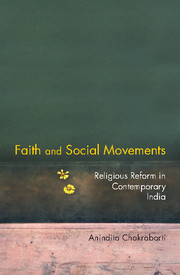Book contents
- Frontmatter
- Contents
- List of Figures
- Preface
- Acknowledgments
- Introduction: Dissent, Religion and Civil Society
- Part I Svadhyaya Ethics and the Spirit of Voluntarism
- 1 Theologies of Self-reform: What Transforms the Cross?
- 2 Praxis of an Emergent Congregation: Metaphysics of Reform and Rebirth
- 3 The Structure of Lokasaṃgraha: Volunteers, Networks and Training
- 4 Succession, Routinization of Charisma and Judicial Religion
- Part II The Tablighi Jamaat's Call for Self-reform
- Conclusion: Religion, Movements and Secularity
- Glossary
- Bibliography
- Index
1 - Theologies of Self-reform: What Transforms the Cross?
from Part I - Svadhyaya Ethics and the Spirit of Voluntarism
Published online by Cambridge University Press: 28 February 2018
- Frontmatter
- Contents
- List of Figures
- Preface
- Acknowledgments
- Introduction: Dissent, Religion and Civil Society
- Part I Svadhyaya Ethics and the Spirit of Voluntarism
- 1 Theologies of Self-reform: What Transforms the Cross?
- 2 Praxis of an Emergent Congregation: Metaphysics of Reform and Rebirth
- 3 The Structure of Lokasaṃgraha: Volunteers, Networks and Training
- 4 Succession, Routinization of Charisma and Judicial Religion
- Part II The Tablighi Jamaat's Call for Self-reform
- Conclusion: Religion, Movements and Secularity
- Glossary
- Bibliography
- Index
Summary
Can you show us a single village that is based on the lofty principles of the
Hindu religious thoughts?
The question posed to Dadaji at a religious congress held in Japan 1954One could not talk about spirituality if one had not experienced it. But we
could easily speak about ethical and moral precepts. What was even more
important than that was the ‘relationship’ that we developed with the people
when we met them at regular intervals.
Former senior leader, Mumbai 2005While articulating their theology of self-reform, Dadaji has never placed Svadhyaya within any particular Hindu sectarian tradition but within the discourse of human welfare. The limit of the project of modernity is the starting point of Svadhyaya's self-articulation. In his speeches and writings at the time of the Japan Conference (1954), and decades later at the time of receiving the Ramon Magsaysay Award for Community Leadership (1996) and the Templeton Prize in Religion (1997), Dadaji explained the aims and goals of Svadhyaya. These speeches harp on the presence of religion in civil society. They establish the view that religion has an important role to play in the matters of collective good: a role that religion has lost in the post- Enlightenment world. Dadaji points out that there is nothing wrong with the concepts of liberty and equality but they are concerned with the individual and not with the collective. Moreover, ‘While the concepts of rights and justice excite our minds, they do not automatically inspire us to work for human welfare. It is the concept of duty that makes us do so’ (1954).
Dadaji critiques the materialist philosophy of life and observes that human deprivation in contemporary times could not be redressed either by the welfare capitalist or the socialist models. Both the Industrial and French Revolutions that led to capitalism and democracy respectively are based on a materialist philosophy of life. He argues that society is not possible without ethics and morality, which materialism does not emphasize. Moreover, these concepts do not take into account that the ideals of social and spiritual wellbeing in our society are different from that of the West.
- Type
- Chapter
- Information
- Faith and Social MovementsReligious Reform in Contemporary India, pp. 29 - 58Publisher: Cambridge University PressPrint publication year: 2017



